Vess'ka
"Gods of the little things..."
In the south of Hariel Minuta, deep within the wastes of Veric, one intelligent species thrives off the desolation inherent to the region... the insectoid centaurs known as Vess'ka (name is both singular and plural). Living in a hive-like complex systems of tunnels and caves dug directly into the rock of such ranges as the Wyrm's Crest, the vess'ka vacillate from reclusive underground dwellers to far travelers, depending on their phase of life.
Vess'ka stand upon four legs, granting them an average height between 6-7'. Further, the length of their bodies are nearly as expansive (at full extension). They can even be ridden as mounts, though one must be extraordinarily close with a vess'ka to be granted this intimate boon. Vess'ka can expand and contract the length of their bodies, somewhat extremely (collapsing lengthwise to about three feet) so that they may squeeze into tighter spaces (conversely, they may "puff up" to intimidate). A vess'ka may stand on its two hind legs, raising its height even further, however this is rather uncomfortable for them, and is typically reserved for either intimidation or mating rituals.
Beyond their rather large size, they are even more physically imposing due to their thickly armored carapaces (many of which feature natural spikes). In addition to their four powerful legs, they also typically (depending upon colony) have four arms with four radial digits, capable of complex operations. In addition, they are naturally ambidextrous and can rotate their hands almost 180 degrees. There are certain colonies of vess'ka whose members only have two arms, and these appendages tend to be more powerful than those of their four-armed brothers.
As eluded to before, vess'ka display a wide range of physical variation between members of the same species, and many display elongated, mantis-like features (these are called "Eretas"), while others (on the opposite extreme) feature squat faces akin to millipedes (and are called "Mitras"). Further, their range of carapace colors is rather wide (from vibrant blues to rich reds), and not necessarily determined by environment. Unlike their thri-kreen cousins, they cannot alter their colors in order to camouflage themselves. Finally, the more mantis-like of the species (typically) have two large, multifaceted eyes, while others feature four smaller, glowing orbs. Despite the extreme variances within the overall race, members of a particular (unified) colony tend to flaunt strong physical similarities, and outsiders often have difficulty distinguishing one vess'ka from another other (of its own colony).
Vess'ka are herbivores by nature, despite their passing resemblance to the mantis (or even the thri-kreen). They are pacifists who only kill in self defense, and when exposed to other races (which is often rare) tend to make all attempts towards fostering good relations. They are native empaths, and this telepathic empathy emotionally binds them to most other species they make contact with, including animals.
The average vess'ka can be expected to live around sixty years, slightly less than the typical human. However, they reach physical maturity by age eight. When a colony member comes of age, they suddenly begin to feel the strong pull of wanderlust. The great unknown beckons, and the young adult will leave its home in search of adventure. This period in a vess'ka's life cycle averages about five to ten years, after which they return home to assume an important role in the colony's operation. These roles are personal callings that are "discovered" during the vess'ka's travels.
The vess'ka communicate amongst themselves using innate, vibratory voice boxes that make all communications sound like complex and lovely music. This language is understood by few outside their species, but most outsiders consider their musical language beyond beautiful. A conversation between vess'ka can take on the outward appearance of a master composer's magnus opus, and just utilizing this, many vess'ka are drawn to the bardic profession.
In conversation with outsiders, the vess'ka rely on their racial telepathy, which allows them to transmit their thoughts directly to other sentient beings (including many animals). If the recipient is not also telepathic, they can only receive messages, and must rely on other forms of communication to reply. Thankfully, the vess'ka are a somewhat scholarly species, and most understand at least several languages beyond their own.
STRANGE THEOLOGY
The vess'ka are sometimes called "God Bugs" because of one of their most bizarre, innate abilities. Their telepathy, beyond simply connecting with other intelligent species, also grants the vess'ka the means to commune with regular insects. In fact, they can hardly shut out the thoughts of insects amassed within a hive (and featuring a more complex hive mind). They are able to then impart their wisdom and aid to those lesser beings they share this bond with. It should be noted that this form of two-way telepathy is only present between vess'ka and other insects (specifically those forming a hive mind). In this capacity, they are revered as gods by the far smaller hives with whom they remain in relatively constant contact. The vess'ka see this communion with their primordial "ancestors" as a solemn duty, and they spend much time attempting to answer the "prayers" of the insects who reach out to them. They take their status as "deity" very seriously. Typically it takes a collective hive mind to make an actual, discernible request of them, however the vess'ka can also read the emotional state of even individual bugs, and they use this empathy in an attempt to better the lives of all insect-kind. Because of this bizarre communion, a vess'ka is never truly alone. There are always voices in their heads. They see this as a divine state and welcome it. In fact, the quickest way to make a vess'ka insane is to somehow inhibit its telepathy, isolating it from the myriad voices it needs for companionship. Vess'ka are inherently social creatures, and true isolation is their greatest fear in life.VESS'KA PLAYER CHARACTERS
For the purposes of PC adaptation, we'll examine two distinct colonies of vess'ka from which the player may choose. The first is the mantis-like Vak, and the second is the more millipede-like Viss. * Vak characters have two large, multifaceted eyes, four legs and four arms. Their heads are elongated and mantis-like. Viss characters have four, glowing visual orbs. They also have between four to eight legs, but only two arms. Their heads are more compact than the Vak, and are similar to that of a millipede. They also tend to be slightly more aggressive than their Vak cousins.ATTRIBUTES & ABILITIES
Ability Score Increase. All vess'ka characters increase their Constitution by 2. Vak characters further increase their Intelligence by 1, while Viss increase their Strength by 1. Age. Vess'ka have lifespans slightly shorter than humans, with venerable specimens around age sixty. Alignment. Vess'ka are pacifists, but also enjoy a regimented social structure where each member of a colony has a purpose. They tend towards lawful alignments, and are rarely evil. Size. Vess'ka are taller (and longer) than humans. Your size is still Medium. Speed. Your base walking speed is 40 feet. Tremorsense. The Vess'ka's antennae give it tremorsense out to 60'. Limited Telepathy. Vess'ka have one-way telepathy out to 400'. Enthralling Music. A vess'ka can use its native language to create a musical "composition" with the intent to enthrall or otherwise calm a target that can hear them. Target must make a DC12 Charisma Save or become charmed for 1 minute. The save is repeatable. This ability can be used 3 times/per long rest. Carrying Capacity. Vess'ka use their Constitution to determine their carrying capacity. Because of their size and build, they may carry 20 times their Constitution score. Natural Armor. It's difficult for Vess'ka to find armor to fit them, however their carapace carries a natural Armor Class of 15. This is in addition to any Dexterity modifiers. Languages. You can understand, read and write Common. You can speak, read and write Vess'kan (this is the only language you can physically speak without telepathy). You can understand, read and write one additional language. *This section is a work-in-progress and hasn't been extensively play tested yet. For an exemplar of the species, check out the article on Kreet Viquik, the vess'ka ranger.Basic Information
Anatomy
The average Vess'ka stands approximately 7' tall, supported on four legs, like a biped. However, in addition to these four legs, they also have four arms ending in four fingered hands, capable of manipulating complex tools.
The tribe of origin determines the specifics of many features inherent to each Vess'ka, with some having two large, multifaceted eyes, while others have four smaller, seemingly glowing orbs from which to view their surroundings.
The more mentis like are called Eretas, while those of the other extreme are called Mitras. Game statistically, there is little difference between the two types.
The Vess'ka also have the ability to expand or contract their segmented bodies, reaching around the size of a riding horse at full extension, and approximating the size of an ostrich when collapsed.
Genetics and Reproduction
Vess'ka live the majority of their lives asexually. Periodically, however, if the colony numbers begin to dwindle, certain members of the group will spontaneously generate temporary sex organs (both male and female) for the short-term purposes of replenishing their numbers. As this only happens when the need arises, it creates both a relative amount of population control and a rather small, close-knit colony.
Growth Rate & Stages
As mentioned previously, vess'ka tend to reach maturity by around the age of eight. They maintain the same level of size and health throughout their lives, until they reach the venerable age of around sixty.
Ecology and Habitats
Vess'ka tend to be happiest in arid, desert regions. They prefer to dig their network of interconnected caves within the rock of mountains in such an arid zone.
Dietary Needs and Habits
Vess'ka are traditionally herbivores, but can eat meat if the need arises.
Biological Cycle
The vess'ka molt and shed their carapaces several times in their life cycles. Before they reach maturity, a younf vess'ka will shed it's carapace once nearly every year. Upon reaching its mature size, the vess'ka will only shed its carapace one to two more times, depending upon how long it lives.
Additional Information
Social Structure
Vess'ka colonies are called Kivram (both singular and plural). Of course this name is only used by outsiders, and in the vess'kan written language.
Within each kivram, each adult vess'ka has a unique or important role which they discover "naturally" during their adolescent wanderings. The colonies are led by a council of elders who are not so much elected, rather they "found out" they were meant to lead during their travels. Vess'ka never lie or inflate their status, so when one proclaims they are meant to lead, the others take this at face value. Because of this, the actual number amongst the ruling class expands or contracts with time, and is rarely consistent.
Outside of the leaders of the kivram, one of the most important roles is that of the spiritual leader. Vess'ka are an extremely spiritual species, though ironically they do not venerate any particular deity themselves. Their spirituality is tied to the very world itself. They see value in all life, with a particular emphasis on the lower insects. They do not have delusions of grandeur, but they do allow themselves to be lifted up and venerated by the insects they maintain contact with. The spiritual leader's role is to create a unified base of theology from which the others within the kivram advise and answer the "prayers" of their insect followers.
Other roles within the community include protectors, artisans, advisors, librarians, heralds, harvesters, educators, etc. There is little need for a police force, as crime within a kivram is relatively unheard of. In the extremely rare circumstance when a crime is committed, law enforcement falls to the protectors (normally tasked with dealing with outside threats).
Unlike other insects, there is no "queen" at the center of a kivram, as all vess'ka are asexual until the need arises to repopulate the colony. During the period in which several or more vess'ka develop temporary genders, they are revered and protected by the entire colony until their work is complete. This is a relatively short period, as the internal gestation time (until a female vess'ka delivers eggs) is only a matter of weeks.
Once eggs are laid, it becomes the entire colony's responsibility to care for them. This is the one role that is shared by all, and there is no job classification for nurse maids. Once hatched, the "newlings" are almost immediate handed off to the educators. They do not even necessarily live with their parents. Rather the entire community is directly involved in their raising.
Uses, Products & Exploitation
PSYCHOPOMP
The natural secretions of the vess'ka brain, specifically those produced during the act of telepathy, are the base ingredient of Psychopomp, a potent illegal drug marketed to only the richest amongst the world's populace.
The drug is extracted, quite painfully (and possibly fatally) from the pituitary gland of an adult vess'ka. Once synthesized by a trained alchemist, it can be ingested to stimulate a unique and bizarre effect. Those under its influence undergo a form of hereditary or genetic "time travel," as they pass down the history of their own family's collective unconsciousness until they eventually "land" on a particular, if possibly random, genealogically linked spirit of the long dead. The user is then able to commune with their dead ancestor, gaining both their knowledge and, some say, at least a portion of their powers and abilities (assuming they had any to give).
This powerful drug is typically only taken once, and provides no pleasure to the user, therefore it is considered difficult, pointless (and expensive) to abuse. That being said, users have been known to return from their "trip" beyond the veil having been "changed" in some esoteric manner. They're often more detached from humanity (or whatever culture from which they originated), but also more powerful or perhaps enlightened as well.
What those in communion speak of, and what passes between them, is always a closely guarded secret, and often the user will protect it with their very lives (or that of others).
The drug itself is deemed illegal in most lands (save for in the east), largely due to the cruelty involved in its extraction, but also connected in part to the unknown application of the power and information it provides.
As far as the vess'ka themselves, they do not seem to have (or have not publicized) any native own ability to commune with their own dead. But, as mentioned before, they are a rather secretive race.
Facial characteristics
As noted before, vess'ka tend to resemble several different insects, at least facially. The Eretas share a basic similarity to the mantis, while the Mitras look somewhat like millipedes.
Geographic Origin and Distribution
Colonies of vess'ka are most often found in the south, at least as it pertains to the west. They live in relative isolation within the Wastes of Veric and the surrounding Wyrm's Crest mountains. In Golthien, it is rumored that their population is much more widespread.
Perception and Sensory Capabilities
The vess'ka see the world through a set of either two multifaceted eyes, or four smaller orbs, depending upon which colony they hail from. Despite the size or number of their eyes, their vision is not particularly strong. They rely more on their two antennae to pick up the vibrations of their surroundings. They have an average sense of hearing, but an extremely acute sense of taste. This tends to make them fantastic, if experimental chefs, and banquet style meals are a major event in the lives of the vess'ka. Their sense of touch is somewhat limited, not only due to their hardened carapaces that cover roughly 90% of their bodies. Each vess'ka (save for those few souls born with birth defects) has innate telepathy, and they use this to communicate with outsiders who cannot understand their native language. However, they prefer to communicate musically, for it carries a degree of "emotional shading" that is harder to express telepathically. They tend to think of telepathy as invasive and blunt, and typically reserve its use amongst themselves for times of sheer necessity.
Civilization and Culture
Naming Traditions
Vess'ka names are impossible to pronounce by any other species, at least without the aid of musical instrumentation. Because of this, vess'ka who consort with other species allow their non-vess'ka friends to grant them pronounceable, "human" names. Often these are along the lines of nicknames, given to highlight a particular feature or trait of the vess'ka in question.
Some vess'ka go out of their way to choose extremely "normal" human names, as they think this will help them blend in. In actuality, it just comes off as extra odd, especially when meeting a vess'ka named "John."
Major Organizations
Vess'ka are organized by individual colonies, each independent of another. Each vess'ka within a colony tends to be directly related to all other members, and as such colonies are more like extended families than just an organizational grouping.
Vess'ka do trade with other colonies within close proximity, though oddly they tend to get along better with complete outsiders from other species than they do with other groupings of their own kind. This may be due to the fact that each colony has a pretty unique point of view and "portfolio" (when it comes to their sovereign status over other insects). Some colonies are more aggressive than others. Some are more prone to nomadic wanderings. Things like that.
Relationship Ideals
Vess'ka are monogamous and mate for life.
History
Vess'ka were first encountered by outside species when men began traversing the Wastes of Veric to reach the southern coast. It is unclear if the Vess'ka occupied the land in the previous age of Lumeria, and they tend to keep their own personal history rather private.
Vess'ka are ardent recorders of history and culture, and each colony maintains an extensive library, dedicated to the culture of the particular colony. As much as they are social with outsiders, this is the one thing they tend to be quite private about.
As far as their origins are concerned (and this may have something to do with their privacy on such matters) the vess'ka are rumored to be either amongst the original inhabitants of Gothenya, before the coming of Celene. Some believe they fell from the stars many eons ago and were, along with humans, the first to colonize the lands. Their relatively small numbers seems to indicate that they were perhaps largely dominated by human tribes of the time. As peaceful of a people as they are, this doesn't seem to be much of a stretch.
Sadly, in the lands of the far south and in cities such as Qudra, vess'ka tend to often appear on the slave market. Perhaps this is due to their reluctance to fight, even in their own defense.
Genetic Ancestor(s)
Genetic Descendants
Scientific Name
Mantodea Sapien
Origin/Ancestry
The origin of the vess'ka is unknown, even to them. Because of their alien appearance, many believe them to have fallen from the very stars. Others believe them to be related to the thri-kreen.
Lifespan
60 years
Average Height
6'5"
Average Weight
280 lbs
Average Length
7'
Body Tint, Colouring and Marking
Vess'ka come in a wide variety of colors, with carapaces ranging from a series of deep blues or fiery reds. It's important to note that their individual coloration is mostly due to hereditary factors, and not habitat. Unlike their thri-kreen relatives, they do not adapt to their environment.
Related Myths
Remove these ads. Join the Worldbuilders Guild

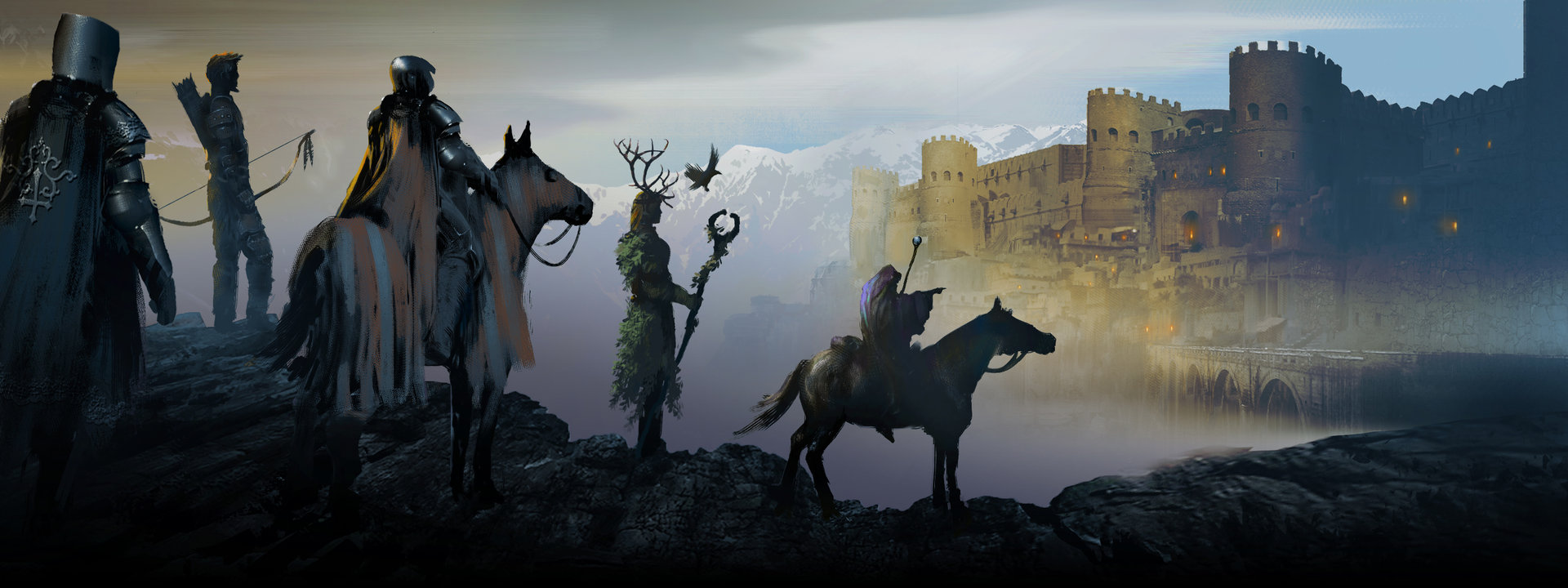
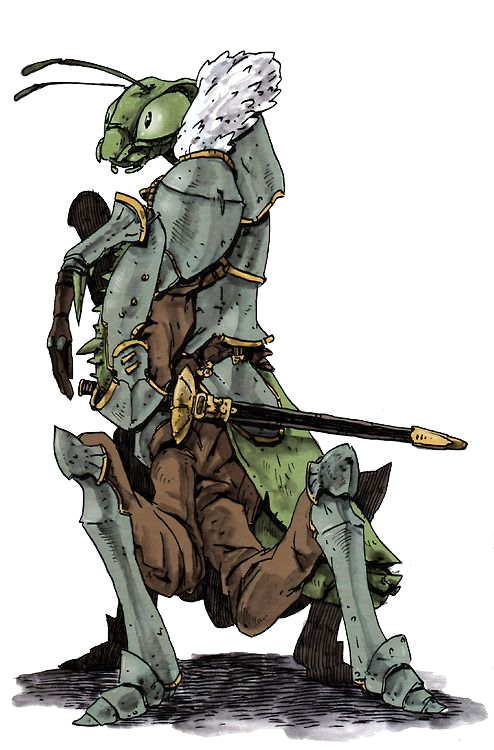
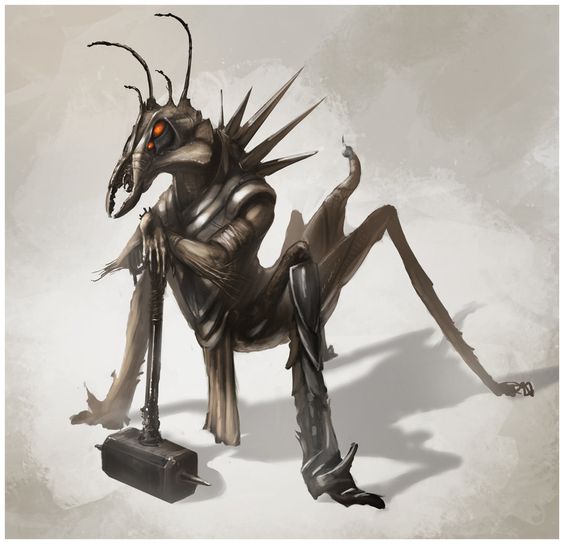
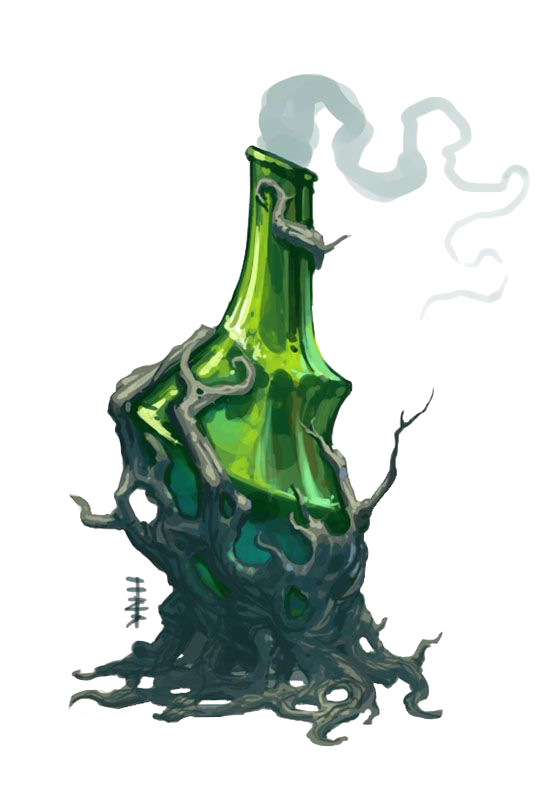

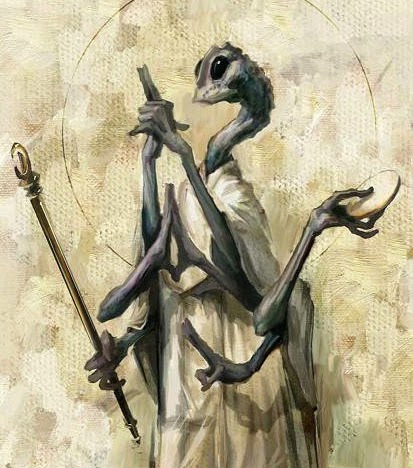

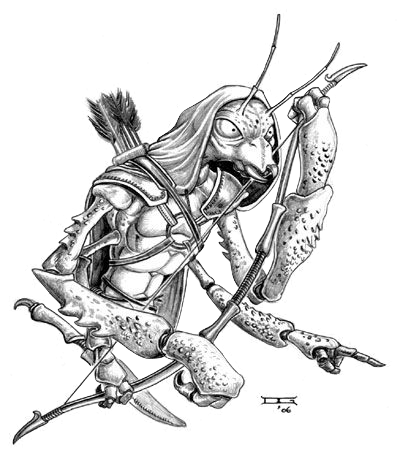
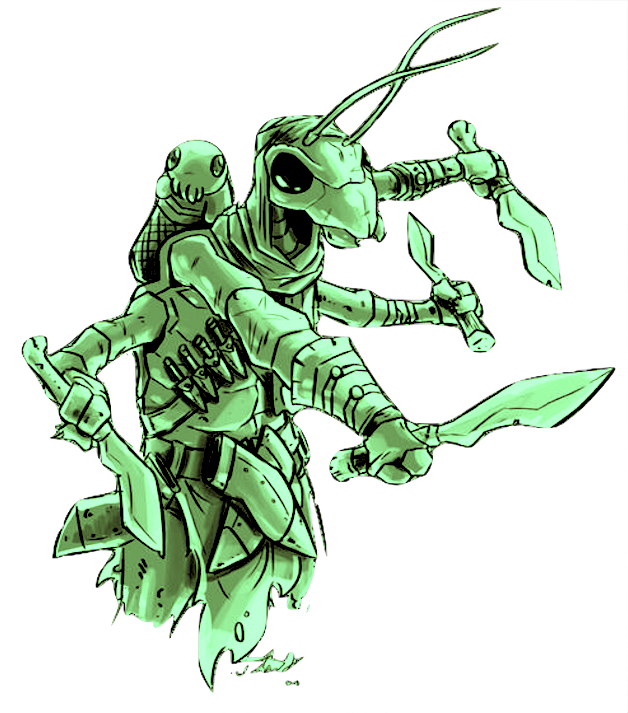
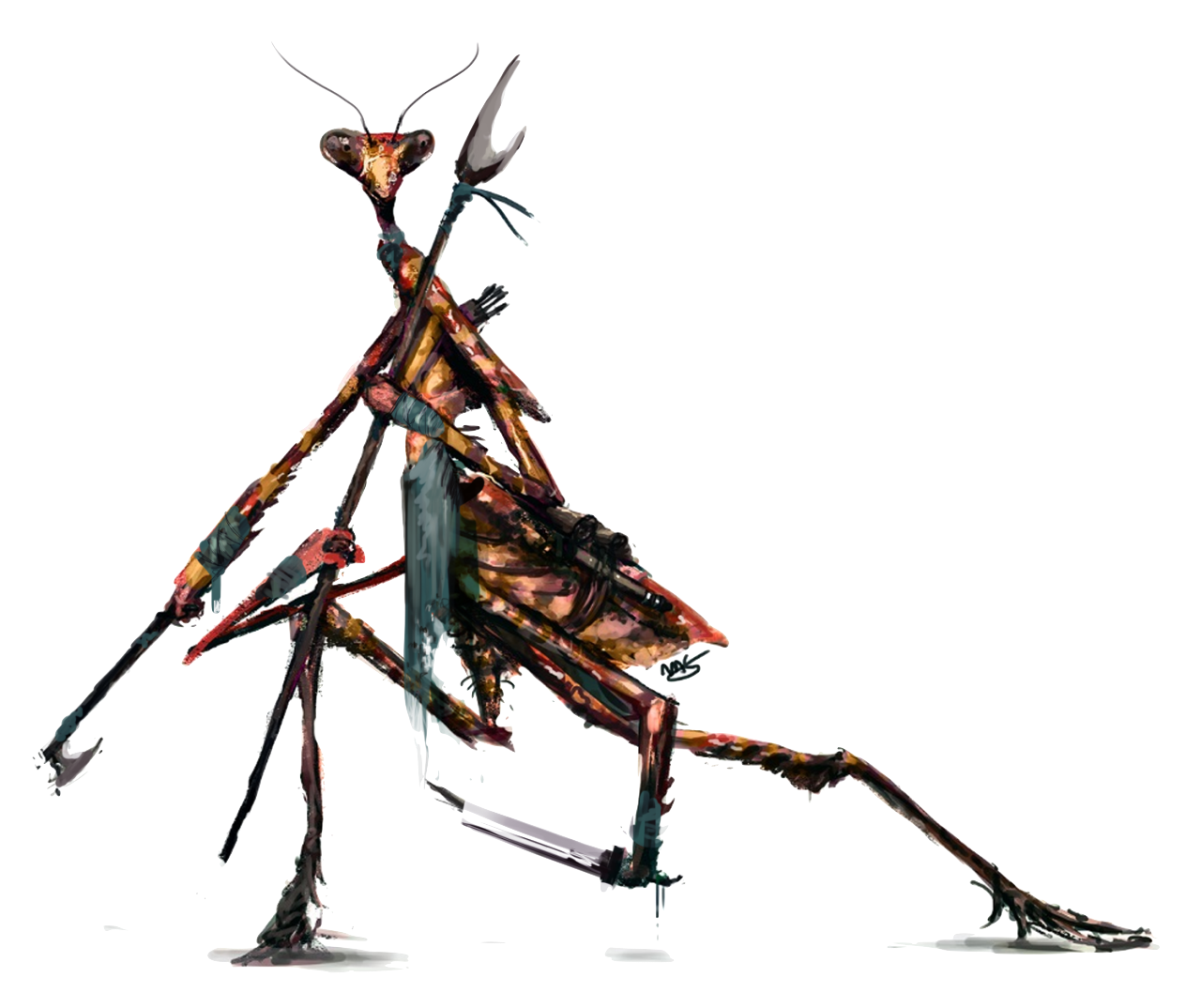
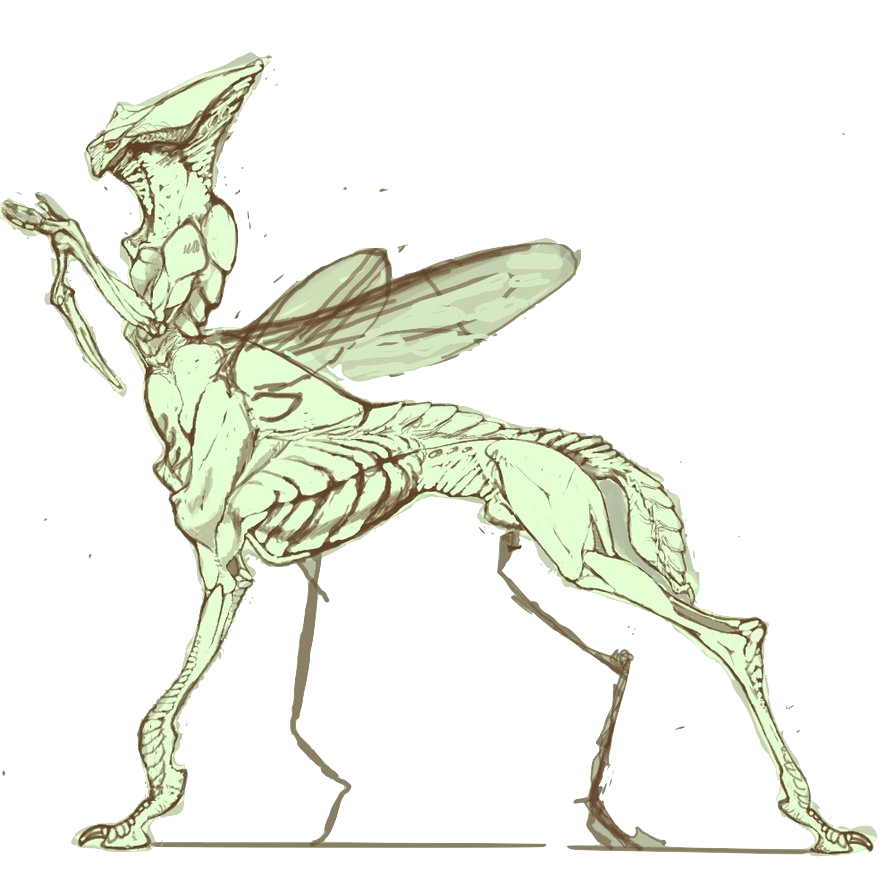

Comments